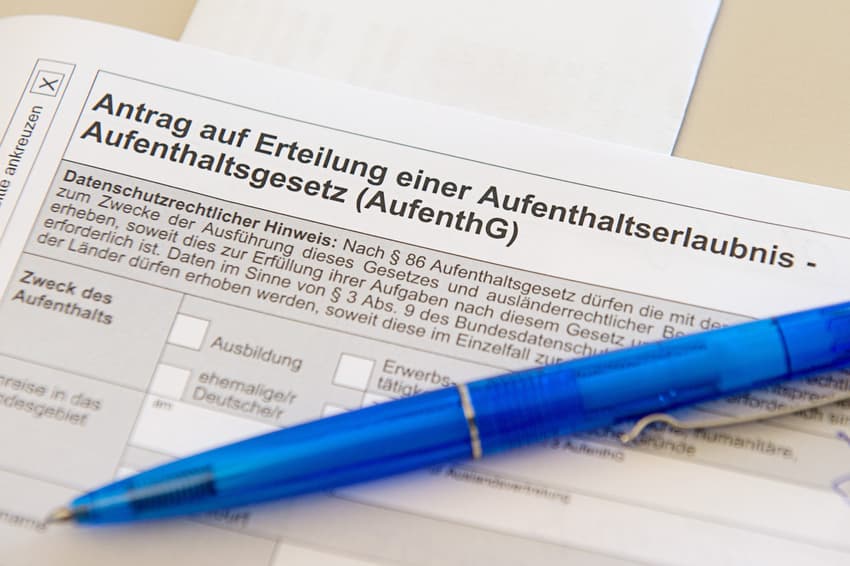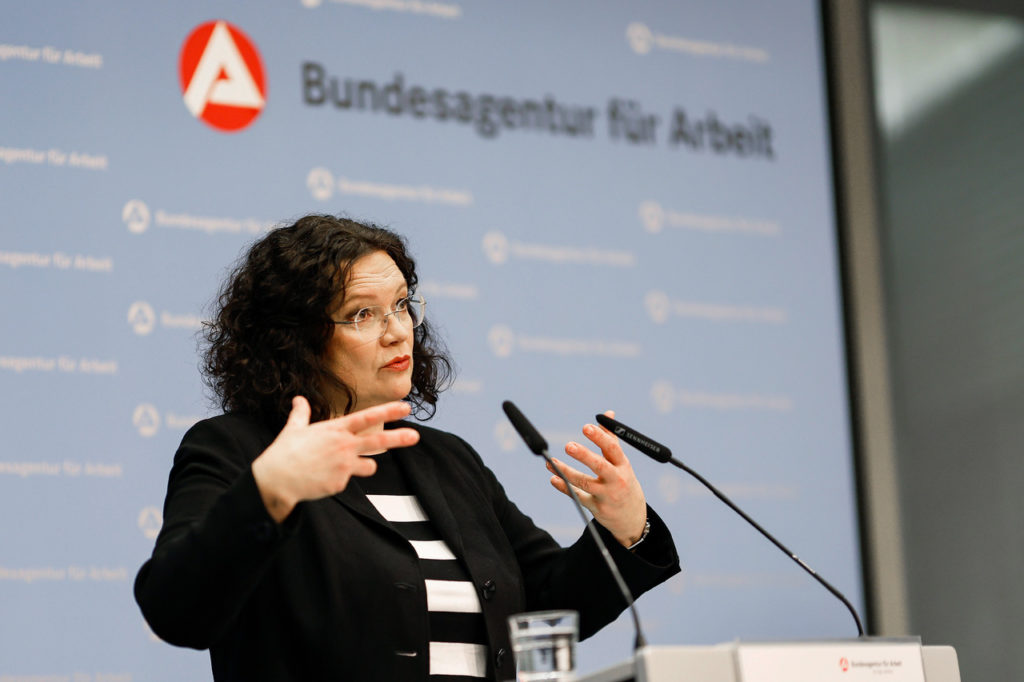Are Germany’s proposed immigration law reforms unworkable?

The German government's proposals to relax immigration laws for skilled workers are expected to be presented in a draft law in March. But huge backlogs at immigration offices throughout the country are casting doubt on whether the plans are realistic.
What’s going on?
At the end of November last year, Germany's Federal Cabinet adopted key points for a new skilled labour immigration law.
Among other things, the proposed reform provides for an "opportunity card" that would allow potential workers to enter Germany without already having a permanent employment contract. The plans will also lower salary thresholds and make the recognition of foreign qualifications easier.
Federal Labour Minister Hubertus Heil (SPD) recently announced that the draft skilled labour immigration law will be ready in early March.
"It is clear that Germany needs additional skilled immigration. I expect that we will pass a bill for a modern immigration law in the federal cabinet in early March," Heil said.
READ ALSO: EXPLAINED: How Germany plans to make immigration easier for skilled workers
However, recent reports about overstretched foreigners authorities - where non-EU foreigners have to go to get their visas and residency permits processed - have thrown into doubt whether the new law will really be workable in practice.
Now, even the Chairwoman of the Federal Employment Agency, Andrea Nahles, has said she has doubts about the success of the planned immigration law due to bottlenecks at the foreigners authorities and slow visa issuance at German consulates abroad.
Nahles told the Frankfurter Allgemeine Sonntagszeitung that she is"not convinced that the necessary number of workers can be achieved with the proposals".
Foreigners' offices that can't keep up
The "bottlenecks" Nahles referred to were on full display in a recent report by the Frankfurter Allgemeine Zeitung, which painted a dismal picture of the current state of affairs at immigration offices in Germany's ten largest cities.
All of the cities contacted by the publication reported having backlogs and some reported shocking statistics.
According to the report, 25,000 e-mails and online applications are currently unanswered in Munich. According to officials, 17 percent of open inquiries concern academics - around a quarter of them students.
READ ALSO: 'Traumatising': Foreign residents share stories from German immigration offices
In Stuttgart, there are currently 15,000 unanswered e-mails and online applications and 4,000 in Essen.
According to the report, the only information provided from Germany's largest city, Berlin, was that the responsible state office was "extremely burdened".
In December, Annika Allendorff, an area manager of the Foreigners Authority in Frankfurt am Main told the Spiegel newspaper that there were 15,000 unprocessed e-mails at the main immigration office in the city.
Allendorff told the Spiegel: "There are people who send the same application 15 or 20 times because they think we don't process it. At the moment, it just takes three or four months before we can even answer."
Problems at consulates abroad
Another issue hampering foreign workers' access to Germany, according to Head of the Federal Employment Agency, Andrea Nahles, lies with the German consulates abroad.
"We know from practical experience that there are sometimes months of waiting time there," Nahles told the Frankfurter Allgemeine Sonntagszeitung.

Andrea Nahles, Chairwoman of the Executive Board of the Federal Employment Agency, speaks in Nuremberg about the situation in the German labour market in December 2022. Photo: picture alliance/dpa | Daniel Löb
This, she said, is "a significant competitive disadvantage compared to other countries."
What's being done to address these problems?
One of the German government's proposed solutions to help speed up the processes at the foreigners' authorities is digitalisation.
According to the key points of the proposed immigration reform, the intention is to "coordinate closely with the federal states and examine possibilities for optimisation". Exactly how this will be done, however, remains vague.
In Frankfurt, officials are hoping to improve the situation in the next few months. At a recent meeting of the Municipal Foreigners' Council in Frankfurt, Frankfurt's head of public order, Annette Rinn (FDP), said that she was "confident that by early summer conditions will have improved significantly".
READ ALSO: IN DEPTH: Are Germany’s immigration offices making international residents feel unwelcome?
Andrea Nahles said that introducing statewide contact points for foreigners such as those now available in Bavaria and Saarland, would also help improve the situation. "This is the path others should also take," she said.
Regarding the issues with German consulates, Nahles said that only security-related issues should be clarified abroad in order to speed up procedures. "Then the workers could enter first, and the legal issues are clarified here in Germany".
In addition, she said, Germany needs to be more active in promoting itself abroad.
Comments
See Also
What’s going on?
At the end of November last year, Germany's Federal Cabinet adopted key points for a new skilled labour immigration law.
Among other things, the proposed reform provides for an "opportunity card" that would allow potential workers to enter Germany without already having a permanent employment contract. The plans will also lower salary thresholds and make the recognition of foreign qualifications easier.
Federal Labour Minister Hubertus Heil (SPD) recently announced that the draft skilled labour immigration law will be ready in early March.
"It is clear that Germany needs additional skilled immigration. I expect that we will pass a bill for a modern immigration law in the federal cabinet in early March," Heil said.
READ ALSO: EXPLAINED: How Germany plans to make immigration easier for skilled workers
However, recent reports about overstretched foreigners authorities - where non-EU foreigners have to go to get their visas and residency permits processed - have thrown into doubt whether the new law will really be workable in practice.
Now, even the Chairwoman of the Federal Employment Agency, Andrea Nahles, has said she has doubts about the success of the planned immigration law due to bottlenecks at the foreigners authorities and slow visa issuance at German consulates abroad.
Nahles told the Frankfurter Allgemeine Sonntagszeitung that she is"not convinced that the necessary number of workers can be achieved with the proposals".
Foreigners' offices that can't keep up
The "bottlenecks" Nahles referred to were on full display in a recent report by the Frankfurter Allgemeine Zeitung, which painted a dismal picture of the current state of affairs at immigration offices in Germany's ten largest cities.
All of the cities contacted by the publication reported having backlogs and some reported shocking statistics.
According to the report, 25,000 e-mails and online applications are currently unanswered in Munich. According to officials, 17 percent of open inquiries concern academics - around a quarter of them students.
READ ALSO: 'Traumatising': Foreign residents share stories from German immigration offices
In Stuttgart, there are currently 15,000 unanswered e-mails and online applications and 4,000 in Essen.
According to the report, the only information provided from Germany's largest city, Berlin, was that the responsible state office was "extremely burdened".
In December, Annika Allendorff, an area manager of the Foreigners Authority in Frankfurt am Main told the Spiegel newspaper that there were 15,000 unprocessed e-mails at the main immigration office in the city.
Allendorff told the Spiegel: "There are people who send the same application 15 or 20 times because they think we don't process it. At the moment, it just takes three or four months before we can even answer."
Problems at consulates abroad
Another issue hampering foreign workers' access to Germany, according to Head of the Federal Employment Agency, Andrea Nahles, lies with the German consulates abroad.
"We know from practical experience that there are sometimes months of waiting time there," Nahles told the Frankfurter Allgemeine Sonntagszeitung.

This, she said, is "a significant competitive disadvantage compared to other countries."
What's being done to address these problems?
One of the German government's proposed solutions to help speed up the processes at the foreigners' authorities is digitalisation.
According to the key points of the proposed immigration reform, the intention is to "coordinate closely with the federal states and examine possibilities for optimisation". Exactly how this will be done, however, remains vague.
In Frankfurt, officials are hoping to improve the situation in the next few months. At a recent meeting of the Municipal Foreigners' Council in Frankfurt, Frankfurt's head of public order, Annette Rinn (FDP), said that she was "confident that by early summer conditions will have improved significantly".
READ ALSO: IN DEPTH: Are Germany’s immigration offices making international residents feel unwelcome?
Andrea Nahles said that introducing statewide contact points for foreigners such as those now available in Bavaria and Saarland, would also help improve the situation. "This is the path others should also take," she said.
Regarding the issues with German consulates, Nahles said that only security-related issues should be clarified abroad in order to speed up procedures. "Then the workers could enter first, and the legal issues are clarified here in Germany".
In addition, she said, Germany needs to be more active in promoting itself abroad.
Join the conversation in our comments section below. Share your own views and experience and if you have a question or suggestion for our journalists then email us at [email protected].
Please keep comments civil, constructive and on topic – and make sure to read our terms of use before getting involved.
Please log in here to leave a comment.